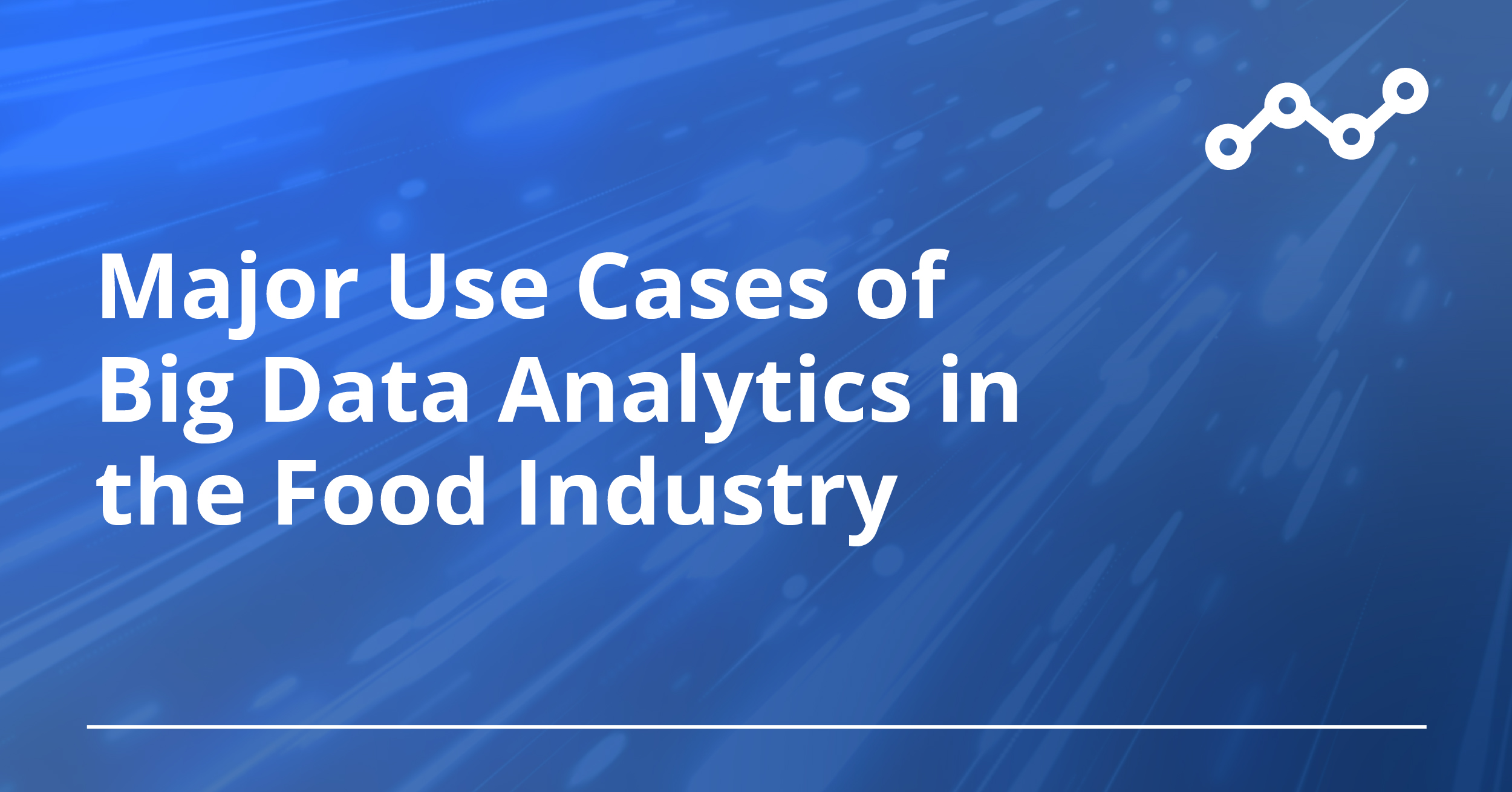Major Use Cases of Big Data Analytics in the Food Industry

The food and beverage industry, spanning from fine dining to fast food, is a ubiquitous part of our lives regardless of our location. While fast food often faces criticism for its nutritional value, it continues to thrive by providing affordable and diverse meal options, treats, beverages, and baked goods to a wide range of people. However, running fast-food chains efficiently and keeping customers satisfied can be challenging, especially during peak hours or late-night rushes.
Fortunately, big data analytics has emerged as a game-changer in the food and beverage industry. Every French fry, chicken nugget, or ice cream sundae sold generates valuable data that fast-food chains can analyze and leverage to improve overall quality and customer experience.
Let's explore some key use cases of big data analytics in the food industry that have revolutionized business practices:
Testing New Products:
Fast food chains can use data analytics to assess the financial impact and popularity of new products, such as food items and in-restaurant technologies, before implementing them. Analyzing customer interactions with drive-through menus, for example, provides insights into their response to specific technologies and changes. Chains can also gather public data and conduct surveys to obtain direct feedback from customers regarding new products or services.
Using retailMetrix's data analytics capabilities, fast-food chains can assess the financial impact and popularity of new products before implementing them. By analyzing customer interactions with drive-through menus and gathering direct feedback, chains can make informed decisions about introducing new food items and in-restaurant technologies.
Improving Operations:
With the increasing adoption of delivery services by fast-food restaurants, analytics can enhance the speed and quality of service. By analyzing data collected from delivery orders, chains can gain insights into customer locations and preferences for home delivery. In-store operations can also be optimized using data on wait times to improve service and reduce customer queuing. Additionally, food and beverage data analysis, combined with predictive analytics, can help adjust staffing schedules based on peak days and hours.
With the increasing adoption of delivery services, analytics can optimize the speed and quality of service. retailMetrix enables chains to analyze data collected from delivery orders, gaining insights into customer locations and preferences for home delivery. In-store operations can also be enhanced using data on wait times, enabling improved service and reduced customer queueing. Additionally, with retailMetrix's predictive analytics, chains can adjust staffing schedules based on peak days and hours.
Effective Customer Catering:
Analyzing customer preferences regarding food products enables fast-food chains to optimize their menus and boost sales. By identifying the most popular or frequently purchased items, chains can make informed decisions about menu changes and eliminate unpopular options to save costs. Data on food allergies and sensitivities can guide them in modifying or omitting ingredients to cater to a larger customer base.
By analyzing customer preferences, retailMetrix empowers fast-food chains to optimize their menus and boost sales. Identifying popular or frequently purchased items helps make informed decisions about menu changes and eliminate unpopular options, leading to cost savings. Data on food allergies and sensitivities also guide modifications or omissions of ingredients to cater to a larger customer base.
Beyond these customer-centric benefits, big data analytics has a profound impact on the food industry as a whole. Global population growth and urbanization have resulted in shrinking agricultural land, prompting key players in the food industry to turn to vertical farming, genetic engineering, and big data analytics. The abundance of data related to seed types, soil conditions, climate, and other agricultural supply chain factors has transformed decision-making processes, revolutionizing the entire food industry value chain.
Here are some ways big data analytics is transforming the food industry:
Precision Agriculture:
Leveraging GPS and GNSS technology, farmers can accurately track field maps and measure variables such as crop yield, terrain topography, organic matter content, and moisture levels. This data enables effective water management, waste reduction, increased crop yield, and minimized environmental impact. Real-time data collected from thousands of tractors worldwide can be analyzed to optimize farming practices.
Leveraging GPS and GNSS technology, farmers can accurately track field maps and measure variables such as crop yield, terrain topography, organic matter content, and moisture levels. retailMetrix's data analytics capabilities enable effective water management, waste reduction, increased crop yield, and minimized environmental impact.
Accurate Information and Forecasts:
Precise information on soil conditions, weather patterns, and market prices, when combined with granular data, allows the food industry to maximize crop yield. By optimizing agricultural inputs, such as water and fertilizers, organizations can reduce costs while improving resource usage and overall crop productivity.
Precise information on soil conditions, weather patterns, and market prices, combined with granular data, maximizes crop yield. With retailMetrix, organizations optimize agricultural inputs such as water and fertilizers, reducing costs while improving resource usage and overall crop productivity.
Food Safety and Traceability:
Big data, combined with the Internet of Things (IoT), enhances food safety and traceability across the supply chain. IoT-enabled sensors monitor food conditions from farm to fork, proactively alerting stakeholders about any discrepancies. Consumers benefit from improved food quality and minimized food wastage. Sensors deployed in factories, vehicles, homes, hospitals, shops, and supply chains worldwide provide real-time data on storage conditions, temperature, and hygiene, ensuring safer food practices.
Combining big data and the Internet of Things (IoT), retailMetrix enhances food safety and traceability across the supply chain. IoT-enabled sensors monitor food conditions from farm to fork, proactively alerting stakeholders about any discrepancies. This ensures improved food quality, minimized wastage, and safer food practices. Furthermore, retailMetrix enables comprehensive traceability throughout the supply chain by utilizing IoT and interconnected devices to track and identify food contaminants, temperature, humidity, and other factors.
Food Safety Efficiency:
IoT-enabled sensors closely monitor crucial data points like temperature and humidity, triggering alerts when deviations occur. Furthermore, big data analytics enables the analysis of bacterial genomes in food samples, facilitating the early detection of harmful bacteria.
Food Safety Through Multiple Data Sources:
Beyond temperature and humidity monitoring, big data extends food safety efforts in the food industry. Regulatory inspection programs utilize publicly available data, including food inspection reports, community and crime information, and weather data, to build predictive models that identify establishments at risk of breaching food safety regulations.

Incorporating retailMetrix's Data Analytics Platform:
By leveraging retailMetrix's comprehensive portfolio of analytics solutions, businesses in the food industry can harness the power of big data and gain actionable insights. The platform utilizes machine learning algorithms and natural language processing (NLP) to identify and capitalize on emerging market trends, helping companies stay ahead in the dynamic food industry landscape.
From understanding evolving customer needs and preferences to optimizing marketing campaigns, reducing food wastage, and improving supply chain operations, retailMetrix's data analytics platform empowers food and beverage companies with a competitive edge. With the ability to analyze real-time information about consumers, products, brands, and competitors, businesses can drive product development, enhance customer relationships, and maximize return on investment.
In addition, retailMetrix offers a user-friendly interface with easy-to-use dashboards and reports, ensuring that your team can easily access and analyze sales, customer, labor, projection, marketing, and other critical metrics. The platform is available as an iOS, Android, and web app, providing seamless access to data anywhere, anytime.
Don't hesitate to leverage the unlimited potential of big data analytics in your food industry operations. Contact retailMetrix today to schedule a demo and unleash the power of data-driven decision-making.
The sheer volume of data generated by food service companies presents a challenge, but big data analytics offers solutions. Tailor-made marketing campaigns and promotions can be devised to target specific customer segments effectively. By analyzing customer data, companies can optimize offers, measure campaign performance, and personalize communication, thereby enhancing customer relationships and maximizing return on investment.
Big data integration also plays a pivotal role in supply chain management, operations, and security within the food service industry. By utilizing barcodes, RFID tags, and sensors, companies can reduce waste, minimize supply chain costs, and ensure the delivery of fresh food to end-users.
To summarize, big data analytics provides valuable insights into consumer behavior, shopping trends, and market developments, empowering food and beverage companies with a competitive edge. It enables the creation of new products, reduction of food wastage, optimization of marketing campaigns, and improvement of supply chain operations. With the right analytics solutions, businesses can stay ahead in the dynamic and ever-changing food industry landscape.
Are you looking to leverage big data analytics in your food industry operations? Contact us to explore our comprehensive portfolio of analytics solutions that utilize machine learning algorithms and natural language processing (NLP) to identify and capitalize on emerging market trends. Let us help you unlock the potential of big data in your industry.
Check out our website for more information on how we can help you succeed, and be sure to follow us on social media with the hashtags #RetailAnalytics #DataDrivenDecisions #SupermarketSuccess for the latest industry insights and updates.
-1.png?width=2600&height=450&name=RetailMetrixLogo%20(1)-1.png)